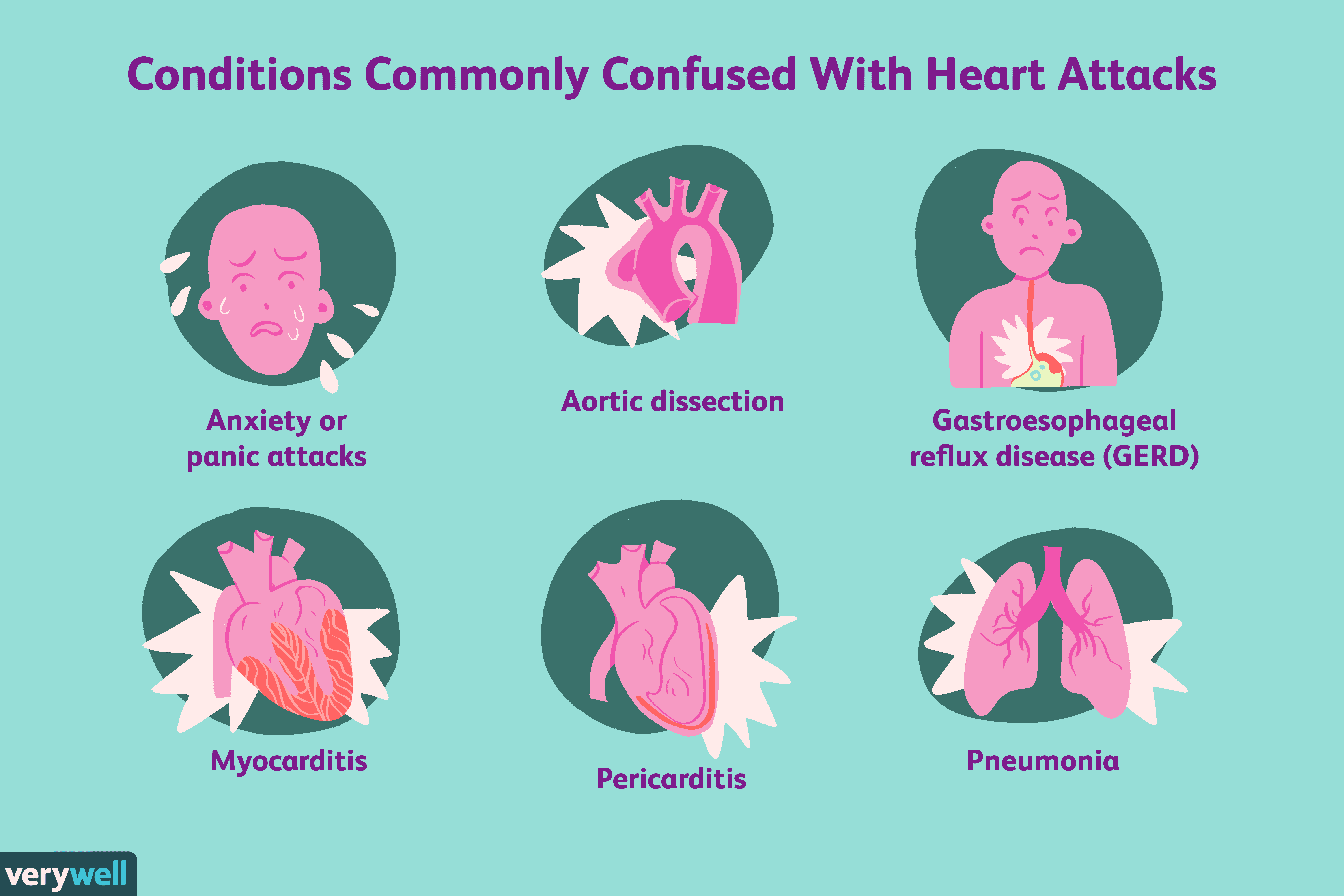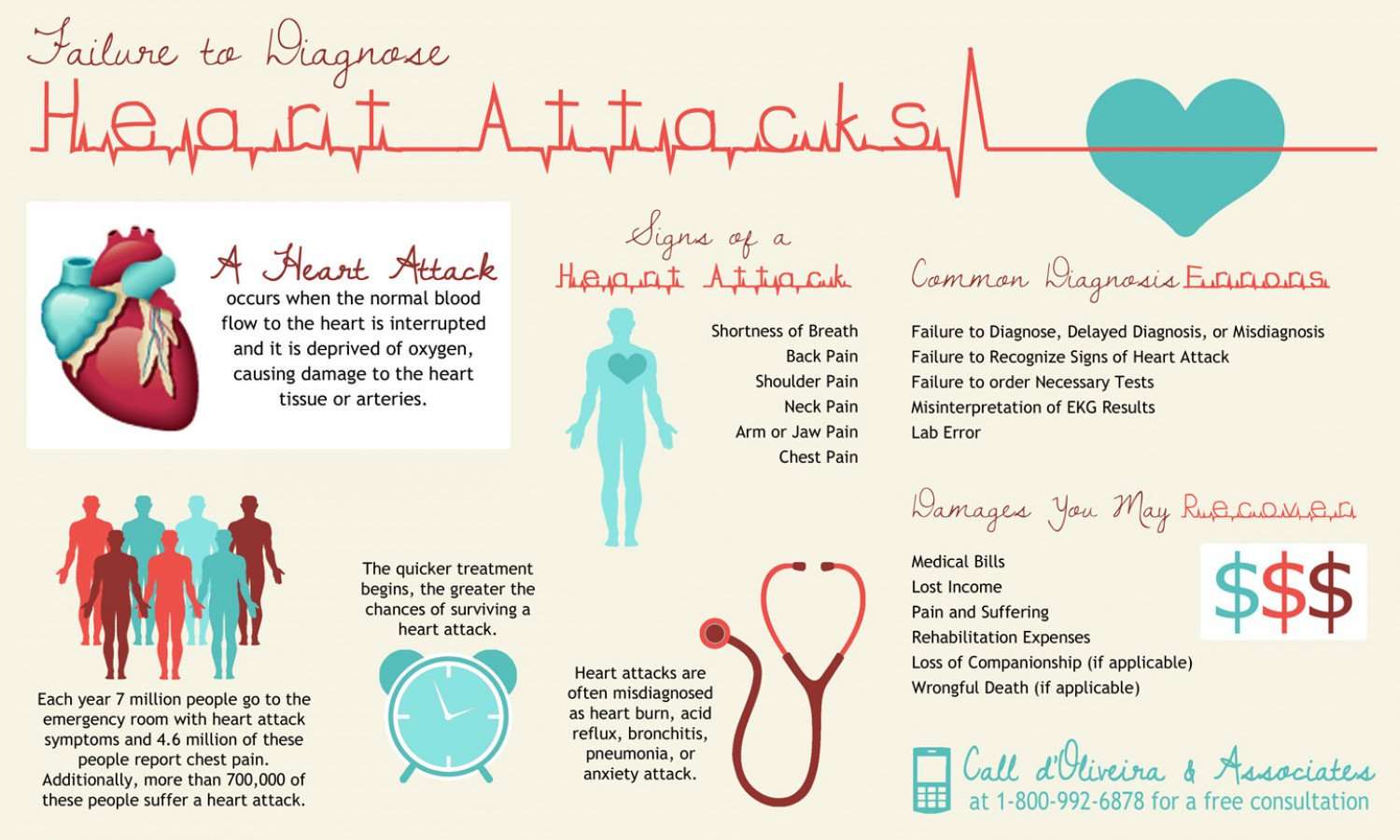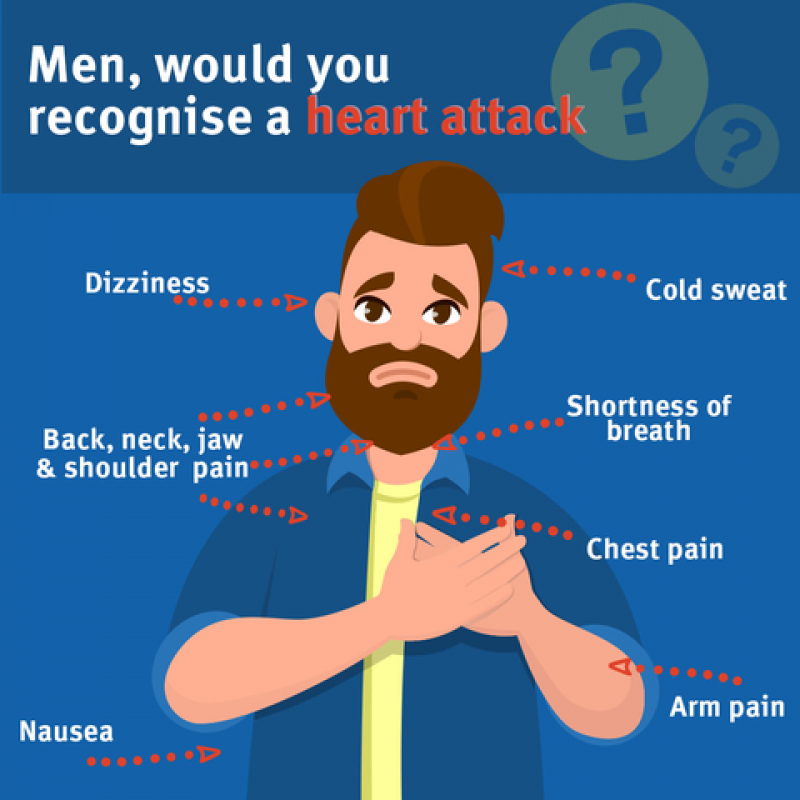Symptoms Of A Heart Attack
Heart attack symptoms vary from person to person. They can include:
- pain or discomfort in your chest that happens suddenly and doesn’t go away
- pain that spreads to your left or right arm, or to your neck, jaw, back or stomach. For some people the pain or tightness is severe, while for others its uncomfortable. It may feel like heaviness, or a burning pain similar to indigestion
- feeling sick, sweaty, light-headed or short of breath.
Its possible to have a heart attack without experiencing all these symptoms, and its important to remember everyone experiences pain differently. This is common in the elderly or people with diabetes, as the condition can cause nerve damage which affects how you feel pain.
Some Common Facts About Heart Attack
- It is estimated that every year, about a million Americans have Heart Attack.;;
- Heart Attack is also known as Myocardial Infarctions , where Myo refers to muscle, Cardial refers to the heart, and Infraction means the death of tissue due to insufficient or lack of blood supply.
- Because of the insufficient supply of blood and the death of tissue during Heart Attack, the muscles of the heart get damaged.
- The chances of Heart Attack increase for women above 55 and men above 45.
- This problem can be fatal. However, there are treatments available for this. Always call or seek professional help in case of any emergency or noticeable symptoms.;
Heart Attack Diagnosis Methods:
- ECG
The ECG is a record of the electrical signals experienced by your heart. Changes in the pattern of an ECG can tell just how much damage has occurred to your heart muscle and the region or spot where the damage has taken place.
- Blood tests
There are certain enzymes needed for the functioning of the heart cells, which are normally found inside the cells of your heart. When these cells get injured, the enzymes within them get released into your bloodstream. Blood tests are done to measure the levels of these enzymes. If the levels rise above the normal range, it is indicative of heart muscle damage.
Another blood test measures the level of a protein known as Troponin . Upon cellular damage, troponin is released into the bloodstream. Detection of troponin in the blood may be indicative of a heart attack.
- Echocardiography
Echocardiography is an imaging test which uses standard two-dimensional, three-dimensional, and Doppler ultrasound to create images of the heart. Additionally, it provides vital information regarding the hearts pumping capacity, the location, and extent of any tissue damage, and the assessment of normal and abnormal blood flow.
- Cardiac catheterization
Cardiac catheterization is a technique used to visualize the blocked artery and help doctors determine which procedure is needed to treat the blockage.
You May Like: Can Too Much Vitamin D Cause Heart Palpitations
Women Have Heart Attacks Too
We know that women tend to wait longer before calling 999 after experiencing heart attack symptoms.;In the UK, an average of three women die of coronary heart disease every hour, many of them due to a heart attack.You dramatically reduce your chance of survival if you don’t call 999 straight away.
Most heart attacks are caused by coronary heart disease .
CHD causes your coronary arteries to become narrowed by a gradual build-up of fatty deposits called atheroma.;
If a piece of atheroma breaks off, a blood clot forms around this to try and repair the damage to the artery wall.;
This clot can block your coronary artery either a partial blockage or total blockage . This causes your heart muscle to be starved of blood and oxygen.;
Other less common causes of a heart attack include:
- hypoxia .
Your Heart Rate Isnt Always Predictable

How this cardiac event affects the heart rate isnt always predictable.
Certain medications may slow your heart rate
For example, if youre on a medication that slows your heart rate, such as a beta-blocker for heart disease, your heart rate may remain slow during a heart attack. Or if you have a type of heart rhythm disturbance called bradycardia, in which your heart rate is perpetually slower than normal, a heart attack may do nothing to increase the rate.
There are certain types of heart attacks that can lead to an abnormal slowing of the heart rate because they affect the electrical tissue cells of the heart.
Tachycardia may speed your heart rate
On the other hand, if you have tachycardia, in which your heart always or frequently beats abnormally fast, then that pattern could continue during a heart attack. Or, certain types of heart attacks can cause the heart rate to increase.
Finally, if you have some other condition thats causing your heart to beat fast, such as sepsis or infection, then it could be causing the stress on your heart rather than being a result of the blockage to blood flow.
Many people live with tachycardia and have no other symptoms or complications. However, if you consistently have a rapid resting heart rate, you should absolutely have your cardiovascular health evaluated.
- lightheadedness
- a vague sense of impending doom
If you think you or a loved one may be having a heart attack, call 911 immediately.
You May Like: How To Calculate Resting Heart Rate
How A Heart Attack Affects Blood Pressure
Blood pressure is the force of blood pushing against the inside walls of your arteries as it circulates throughout the body. Just as heart rate changes are unpredictable during a heart attack, so too are blood pressure changes.
Because blood flow in the heart is blocked and a portion of heart tissue is denied oxygen-rich blood, your heart may not be able to pump as strongly as it normally does, thus lowering your blood pressure.
A heart attack may also trigger a response from your parasympathetic nervous system, causing your heart and the rest of your body to relax and not fight while your heart struggles to keep blood circulating. This can also cause a dip in blood pressure.
On the other hand, the pain and stress from the heart attack can raise the blood pressure during a heart attack.
Blood pressure-lowering medications, such as diuretics or angiotensin converting enzyme inhibitors, can keep your blood pressure low during a heart attack, too.
Risk factors for a heart attack include modifiable factors, such as your weight, as well as those beyond your control, such as your age. Some of the most common conditions that raise your risk for a heart attack include:
- advancing age
What Causes Heart Attacks
The most common cause of a heart attack is coronary heart disease. This is where fatty deposits, cholesterol and other substances build up in the walls of the coronary arteries that supply oxygen to the heart. Over time, this build-up hardens into plaque that can break off at any time and cause a blood clot which blocks the artery.
In some cases, heart attacks have another cause:
- Coronary artery spasm is an unusual narrowing of blood vessels that can stop blood flow to the heart.
- Spontaneous coronary artery dissection is a sudden tear in the wall of a coronary artery, which can also affect people who have few risk factors for heart disease.
Certain lifestyle factors are shown to increase your chances of heart disease and having a heart attack.
You May Like: Acid Reflux Cause Palpitations
When To Call The Doctor
If you have any signs of heart disease, call your health care provider right away. Don’t wait to see if the symptoms go away or dismiss them as nothing.
- You have chest pain or other symptoms of a heart attack
- You know you have angina and have chest pain that doesn’t go away after 5 minutes of rest or after taking nitroglycerine
- You think you may be having a heart attack
- You become extremely short of breath
- You think you may have lost consciousness
How To Diagnose Heart Attack
The Diagnosis of Heart Attack will be done by doctors after performing the physical examination and reviewing the patients medical history. There are several tests available that help in diagnosing Heart Attack. These tests include:
These are the common processes that help to diagnose the Heart Attack and decide the optimal treatment for the patient.
Also Check: Can Acid Reflux Cause Heart Palpitations
A Brief Overview Of Heart Attacks
A heart attack occurs when blood flow to the heart is blocked by buildup inside the arteries. If this buildup goes untreated, there is a larger risk of severe damage to the heart muscle or even death. Knowing how to spot a heart attack when it occurs can be key to the recovery process.;
Note that it is crucial to know the difference between cardiac arrest and a heart attack. With a heart attack, there are a few steps you can take to ease the situation while medical help arrives for the victim, but cardiac arrest requires medical attention immediately.;
Southern Cross Medical Library
The purpose of the Southern Cross Medical Library is to provide information of a general nature to help you better understand certain medical conditions. Always seek specific medical advice for treatment appropriate to you. This information is not intended to relate specifically to insurance or healthcare services provided by Southern Cross. For more articles go to;the Medical Library index page.
You May Like: Can Reflux Cause Heart Palpitations
Take Any Prescribed Chest Pain Medication
If the person already takes medicine for chest pain, they should take it, or make sure they have already taken it, while they wait for the ambulance.
Medications that doctors might have prescribed for chest pain include:
- nitrates, such as Imdur
- beta-blockers, such as Metoprolol, Carvedilol, or Atenolol
Returning To Normal Activities

After a heart attack, most people who don’t have chest pain or discomfort or other problems can safely return to most of their normal activities within a few weeks. Most can begin walking right away.
Sexual activity also can begin within a few weeks for most patients. Talk with your doctor about a safe schedule for returning to your normal routine.
If allowed by state law, driving usually can begin within a week for most patients who don’t have chest pain or discomfort or other disabling problems. Each state has rules about driving a motor vehicle following a serious illness. People who have complications shouldn’t drive until their symptoms have been stable for a few weeks.
Don’t Miss: How Much Blood Does The Heart Pump
How Long Can A Woman Have Symptoms Before A Heart Attack
Many people expect a heart attack to come on suddenly. But research suggests that women experience symptoms for several weeks before a heart attack. A study published in 2003 of 515 women who had experienced a heart attack, reports 80 percent of women had at least 1 symptom at least 4 weeks before their heart attack.
What Is A Heart Attack
A heart attack happens when something blocks the blood flow to your heart so it canât get the oxygen it needs.
More than a million Americans have heart attacks each year. Heart attacks are also called myocardial infarctions . “Myo” means muscle, “cardial” refers to the heart, and “infarction” means death of tissue because of a lack of blood supply. This tissue death can cause lasting damage to your heart muscle..
Recommended Reading: Does Acid Reflux Cause Heart Palpitations
What Are The Risk Factors For Heart Attack
Several health conditions, your lifestyle, and your age and family history can increase your risk for heart disease and heart attack. These are called risk factors. About;half of all Americans have at least one of the three key risk factors for heart disease: high blood pressure, high blood cholesterol, and smoking.2
Some risk factors cannot be controlled, such as your age or family history. But you can take steps to lower your risk by changing the factors you;can control.
Learn more about risk factors for heart disease and heart attack.
About Half Of All Heart Attacks Are Mistaken For Less Serious Problems And Can Increase Your Risk Of Dying From Coronary Artery Disease
You can have a heart attack and not even know it. A silent heart attack, known as a silent myocardial infarction , account for 45% of heart attacks and strike men more than women.
They are described as “silent” because when they occur, their symptoms lack the intensity of a classic heart attack, such as extreme and pressure; stabbing pain in the arm, neck, or jaw; sudden shortness of breath; sweating, and dizziness.
“SMI symptoms can feel so mild, and be so brief, they often get confused for regular discomfort or another less serious problem, and thus men ignore them,” says Dr. Jorge Plutzky, director of the vascular disease prevention program at Harvard-affiliated Brigham and Women’s Hospital.
For instance, men may feel fatigue or physical discomfort and chalk it up to overwork, poor sleep, or some general age-related ache or pain. Other typical symptoms like mild pain in the throat or chest can be confused with gastric reflux, indigestion, and .
Also, the location of pain is sometimes misunderstood. With SMI, you may feel discomfort in the center of the chest and not a sharp pain on the left side of the chest, which many people associate with a heart attack. “People can even feel completely normal during an SMI and afterward, too, which further adds to the chance of missing the warning signs,” says Dr. Plutzky.
You May Like: Does Acid Reflux Cause Heart Palpitations
What Are The Signs And Symptoms Of A Heart Attack
The most common symptom of a heart attack is chest pain or discomfort. Other symptoms of a heart attack include:
- shortness of breath
- to the neck, jaw or shoulders
Most symptoms of a heart attack are the same for men and women.
Women are more likely to feel some discomfort in the chest rather than a sharp pain or tightness. The milder symptoms do not mean that a woman’s heart attack is any less severe than a man’s heart attack. Any symptoms of a heart attack should be taken seriously.
Signs And Symptoms Of A Heart Attack
Symptoms of a heart attack can vary greatly from person to person. Theyre likely to be more severe if youre having a major heart attack, in which a blood clot completely blocks an artery leading to your heart.
- Pain or discomfort in your jaw or neck
- Pain or discomfort in your arms, shoulders, or back
- Indigestion or sense of choking
- Sweating, especially a cold sweat
- Nausea or vomiting
- Rapid or irregular heartbeat
Sudden chest pain is the most common heart attack symptom, but not all people experience it. Some people have only mild symptoms that come on gradually.
Because a heart attack is a medical emergency, dial 911 right away if you experience symptoms that you believe are caused by one.
Also Check: What Branch Of Medicine Deals With Heart Disease
Can You Cough Away A Heart Attack
Take-home message:-A variety of internet posts and e-mail chains have said that when you have symptoms of a heart attack, you should cough vigorously to essentially perform CPR on yourself.-This idea makes no sense because CPR should only be performed on an unconscious person with no pulse. If you are conscious and can cough, you should not perform CPR.
A friend of mine recently asked me to debunk something they saw on the Internet. It was a facebook post that advised people who were having a heart attack to start coughing strenuously and repeatedly in order to perform CPR on themselves. This idea, known as cough CPR, is not new and seems to go back to a series of mass e-mails back in 1999.
The post usually goes something like this:
How to survive a heart attack when alone
Cough repeatedly and vigorously. A deep breath should be taken before each cough and the cough must be deep and prolonged as when producing sputum from deep inside the chest. The cough should be repeated every 2 seconds until help arrives. Deep breaths gets oxygen into the lungs and cough squeezes the heart and keeps the blood moving.
There are several problems with this idea and it is worth noting that neither the American Heart Association nor the British Heart Foundation recommend it. The British Heart Foundation goes so far as to say Please avoid spreading this myth any further. In the end, cough CPR though doesnt quite make sense for several reasons.
Heart Attack: Symptoms Causes And Diagnosis

Heart Attack occurs when the build-up of fat, cholesterol, and other substances block the flow to the heart. The build-up usually forms a plaque in the arteries that help in circulating the blood to the heart or from the heart. Any blockage in this way causes hindrance in the normal blood circulation and when the heart doesnt get a sufficient amount of blood to pumped up, the reflex reaction of the heart can be termed as Heart Attack.
Also Check: What To Do When Someone Has A Heart Attack
Chest Pain: How A Doctor Decides It Could Be A Heart Attack
Posted October 26, 2015
Patients with chest pain come to my clinic with a nervous expression and a million-dollar question, “Doctor, is it my heart?”
Such concern is valid. But understanding how medical providers think about chest pain may allay some fear.
If you come to a clinic with chest pain, your provider will have questions about the major factors for heart disease. I will ask if you:
- smoke
- have diabetes
- assess your age and gender
- check to see if you have a family history of heart disease.
